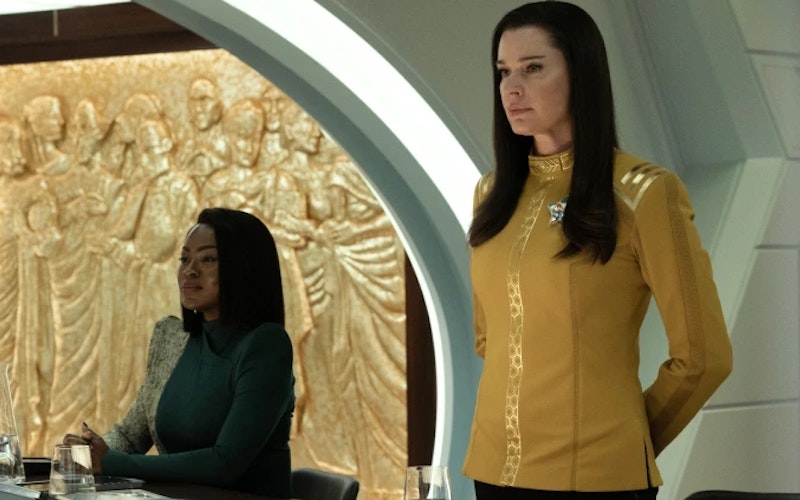
TV
Law and Mercy in Star Trek: Strange New Worlds
What are we supposed to do when we're torn between law and mercy?
The second episode of Star Trek: Strange New Worlds' second season, "Ad Astra per Aspera," took a sword to this Gordian knot, offering the provocative suggestion that there should be no conflict between law and mercy because the law is merciful. Such an understanding of law resonates with Jesus and the Apostle Paul's understanding of the Torah, the law of God as revealed to Moses. Far from being a burden, the law can lead us to liberation in Christ.
Strange New Worlds follows the five-year exploratory mission of Captain Christopher Pike (Anson Mount) and the crew of the USS Enterprise. The series is set years before Captain Kirk would command the legendary Starfleet vessel. Season 1 ended with Commander Una Chin-Riley (Rebecca Romijn) arrested for being genetically modified, something her species practices freely, but is illegal in Starfleet. "Ad Astra per Aspera"—Latin for "To the Stars through Difficulty"—is the trial of Chin-Riley. It stands high on the list of terrific Star Trek courtroom episodes, alongside classics like "The Measure of a Man," "Tribunal," and "Death Wish."
To set the stage, Pike convinces Chin-Riley's fellow Illyrian, Neera (Yetide Badaki), to represent her. There's no doubt that Chin-Riley clearly violated Starfleet law. But so too did Captain Pike by refusing to report her when she confessed to him. The nail in Chin-Riley's coffin appears to be when Neera, her own lawyer, extracts a confession that Chin-Riley herself is the one who leaked her crime to Starfleet (in order to spare the crew from guilt by association).
By the time we reach closing arguments, it's difficult to see how Chin-Riley can be saved. Neera has made a compelling case that Chin-Riley is an exceptional crewperson and a credit to Starfleet. But the prosecuting counsel has argued equally persuasively that the law cannot be law if it can be set aside for exceptional individuals. Justice requires impartiality.
This tension is one with which Christians are familiar. When it comes to God's law and God's compassion, we feel torn. In the years following Jesus' resurrection, the first Christians faced a similar question to that of Starfleet. Jesus gave the church a mandate to preach the good news to all nations and make disciples of them. But what did that mean, exactly? After all, the other nations—the Gentiles—are not children of Abraham. To be anachronistic, they don't have the right genes. The law is clear.
Then Peter had a dream. God presented Peter a smorgasbord of animals—all of them unclean. Three times, God told Peter to eat them. Three times, Peter refused, citing the law. I'm not eating these, God! After all, I'm being faithful to the rules you made! But God says, "Do not call impure anything God has made clean."
Far from being a burden, the law can lead us to liberation in Christ.
We love this dream because it means we can eat bacon-wrapped shrimp. But what happens next makes it clear it was never about the food. Peter awakens to learn that a Gentile named Cornelius has asked to see him. Peter goes to his house and hears testimony from Cornelius and his household that they have received the gift of the Holy Spirit through faith in Jesus. Peter says, “Surely no one can stand in the way of their being baptized with water. They have received the Holy Spirit just as we have.”
That's not quite the end of it. Both Peter and Paul end up at a big council in Jerusalem, arguing for the inclusion of Gentiles in the Jesus movement despite it being contrary to law. And they win out—as evidenced by the Gentile writing this and the Gentiles reading it!
Starfleet faces the same tension when Neera begins her closing argument. She opens the Starfleet legal code and has a member of the tribunal read the law concerning the granting of legal asylum. As the code is read, it dawns on everyone listening that Chin-Riley's case qualifies; it's practically a text-book case study.
Neera faces the judges squarely and, with a joyful smile, says, "Do you know why I love the law? Because the law is not a mirror to society. A law is an ideal, a beacon to remind us how to be our better selves. You have the opportunity today to do just that." Far from advocating that Starfleet set aside their laws, far from advocating that they make an exception for Chin-Riley, Neera implores Starfleet to uphold their law. But not the law against genetic modification. She insists that, "We cannot ignore that [the granting of asylum] is also law. . . . Be your better selves and enforce the law that favors my client with the same dispassion as the laws that would exclude her."
A law is a beacon. In similar language, the Apostle Paul describes the law as a guardian that leads us to Jesus. So too, Jesus insists that his teachings do not abolish the Torah, but rather fulfill it. Jesus shows us the deepest, truest intent of God's law. He shows us what we were created to be. This is why, when he's criticized for sharing a table with those the Torah excludes, Jesus doesn't shrug and say, "Yeah that's a silly, old-fashioned law." Instead, he quotes Scripture (specifically the prophet Hosea): "I desire mercy, not sacrifice." What he's doing is fulfilling the Torah.
In working out our salvation, we experience tension between law and grace, between justice and mercy. But Strange New Worlds reminds us that such a dichotomy is a false one. Because the law is full of grace. Real justice is merciful. If the way we're chasing holiness makes us cruel and unyielding, if our faithfulness drives people away from the love of God, then we're doing it wrong.
Topics: TV